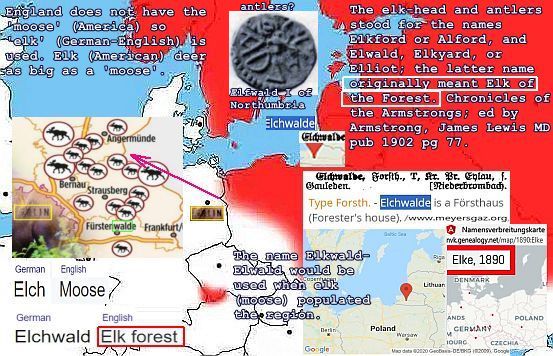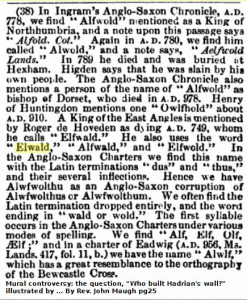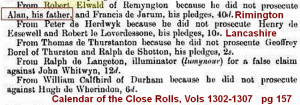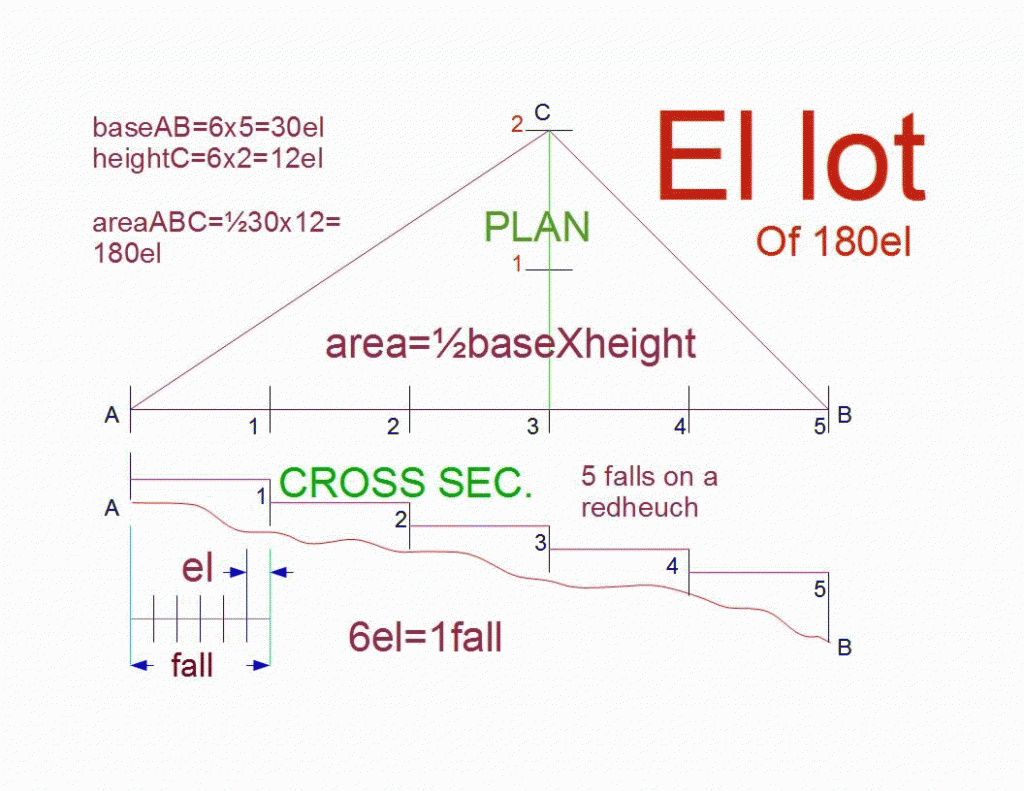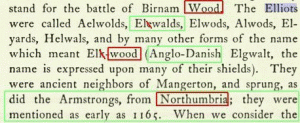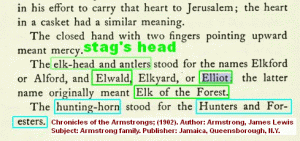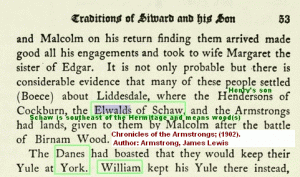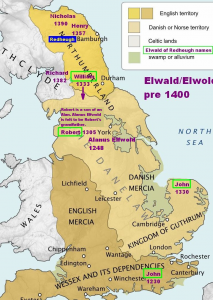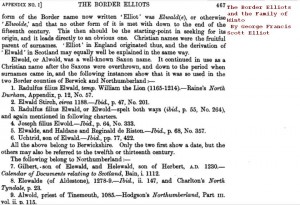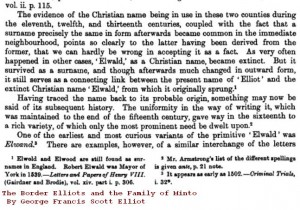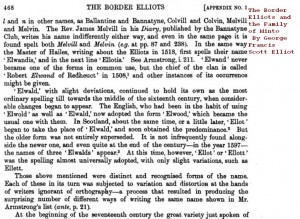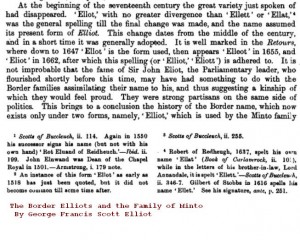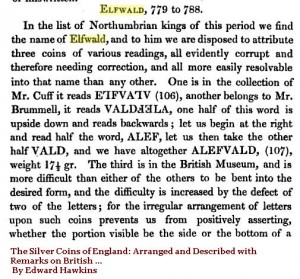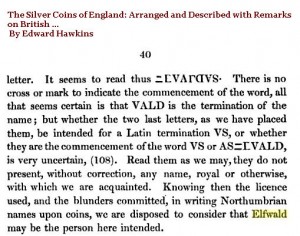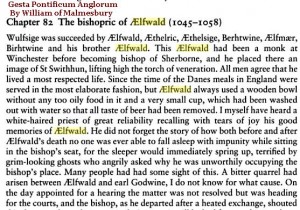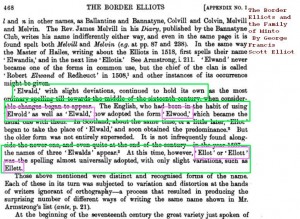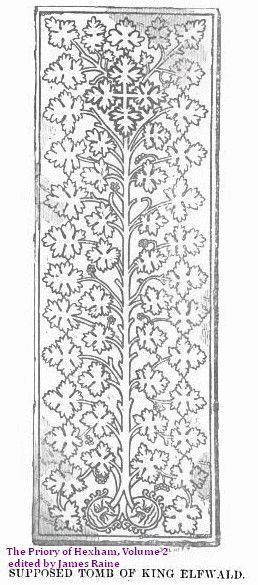 The Anglo-Saxon Chronicle records the murder of King Ælfwald by Sicga at Scythlecester (which may be modern Chesters) on 23 September 788. “This year Elwald, king of the Northumbrians, was slain by Siga, on the eleventh day before the calends of October; and a heavenly light was often seen on the spot where he was slain. He was buried in the church (abbey) of Hexham”.
The Anglo-Saxon Chronicle records the murder of King Ælfwald by Sicga at Scythlecester (which may be modern Chesters) on 23 September 788. “This year Elwald, king of the Northumbrians, was slain by Siga, on the eleventh day before the calends of October; and a heavenly light was often seen on the spot where he was slain. He was buried in the church (abbey) of Hexham”.
Anglo-Saxon name of Northumbrian origins.
 In the name Alanus Elfwold one can see that Elfwold is a form of Ælfwald
In the name Alanus Elfwold one can see that Elfwold is a form of Ælfwald
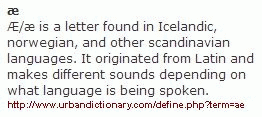 The Æ is used still this day by Scandinavian Countries.
The Æ is used still this day by Scandinavian Countries.
This would be ca 1305, and the name Robert Elwald would be a likely name for the first chief of the line of Redheugh
Which like Ellot of Ettrick Forest, and Liddesdale, Elwald has the meaning of the forest.
El means to measure, an at one time was the unit of measurement for land in Scotland.
All the el means is measured land. Once land is measure it can be owned. An ellot meant a measured lot, in Angus it meant farmland, and in Ettrick Forest and Liddesdale it meant forest stead, a piece of property by ownership like Howpaslot own by the Walter Scot line in Ettrick Forrest, a forest stead by ownership this Scot line could hunt stags on.
A lot is land with as surveyed perimeter. A plot of land which can therefore can be sold.
Small correction;
Feel the the name el lot comes from the length of the sides not the area.
above added 10/14/2013
Though the above is an updated explanation; it is felt that measurement was done horizontally with a compass and a fall or six ell. It is therefore land is measured with ell, and angles, therefore the result is the same but based on length measurement in ell, not area in ell, but giving the same end result.
added MSE 8/30/2013
The word wald (wold Low German) is of German-Nordic (Danish), origin for forest/wood (American English; woods). The name Elwald besides becoming Ellot also became Ellwood. In English the word wood means in American English woods, or small forest.
Symbolized by the head of a stag an animal of the forest.
In The Choronicles of the Armstrongs by James L. Armstrong; we find variations of the name Elwald. It should be noted that the word elk
represents more likely stag (correction; now is is felt it means a UK elk/US moose, indigenous to Europe, and not of the UK, but deer stags were known in the UK so the image was changed to a deer stag on entering the UK) , and the word wood also for woods (both the low wold as in Elwold (wood(s)), and the high German wald as in Elwald (forest), were used an the Elwold are for south of the Scottish border (Cumbria), and the Elwald north of the Scottish border (Liddesdale). The Armstrong in their story of origin have the origins of the Armstrong and Elwald as being Anglo-Danish and of Northumbria.
The stag is characteristic of the Danish forests.
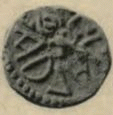
The stag head is used on the coin/sceat of Ælfwald, which was minted in York about 800 AD.
The only serious contention remaining, which is favoured by some modern historians, ascribes the surname to the fairly common old Nothumbrian christian name of Elwold or Elwald. While convenient in its simplicity, evidence of the Clan’s connection is lacking and, with only two references to Elwald as a surname prior to 1400-in 1230 and 1357 (in Northumberland)- we have no way of testing the validity of this theory.
The Elliots; The Story of a Border Clan, by Arthur Eliott, 1986
Mark Elliott 5/15/2013
Appendix;
added 7/11/2013
Elwald names as spelled for coin;
It should be noted this, or English to German pronunciation gives and interchangeability or the w and v in the spellings.
Name used by bishop in later years;
Mark Elliott added 7/26/2013
added 9/12/2013

